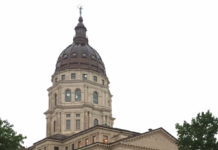The Kansas Senate on Wednesday night passed a constitutional amendment overturning a historic state Supreme court ruling that found the state constitution protects the right to an abortion.
The Senate voted 28-12 to approve the amendment, which has been the centerpiece of the opening days of the legislative session as lobbyists patrolled the hallways of the Capitol making their case on the measure.
The amendment gives lawmakers the right to regulate abortion despite the state Supreme Court’s ruling, which set a higher judicial standard for evaluating abortion regulations passed by the Legislature.
Republican leadership has been expediting the legislation with the hopes of getting it passed within the first couple weeks of the legislative session.
Abortion opponents contend that the court’s decision threatened a series of abortion limits pass by the Legislature in the last decade, including clinic regulations that have been blocked in court since 2011.
“If we don’t pass this constitutional amendment, we will lose the right to have any say over that procedure,” said the amendment’s lead sponsor, Senate President Susan Wagle. “We will give the right to legislate to an appointed body that doesn’t stand for re-election.
“If we don’t pass this amendment and put it on the ballot and let the people of Kansas decide what our role is in this process, we will once again go back to the days of unlimited abortion.”
The amendment still must be approved by the House, where there have been questions about whether it can reach the two-thirds support it needs for passage.
The amendment would go to voters to ratify this August during the primary election.
“I believe it is absolutely wrong to permanently change the Kansas Constitution to potentially put politicians in between women and their doctors when difficult, personal medical decisions need to be made,” said Democratic state Sen. Barbara Bollier.
Opponents tried to stop the amendment, saying it sets up the possibility that the Legislature would try to ban the procedure if Roe v. Wade was overturned.

They said the amendment would allow lawmakers to ban abortion outright without any exceptions.
They cited a passage in the amendment that says the Legislature “may pass laws regarding abortion, including, but not limited to, in circumstances of pregnancy resulting from rape or incest, or when necessary to save the life of the mother.”
Wagle called that accusation a “scare tactic,” saying the legislation wasn’t intended to ban abortions in instances of hardship.
“I’ve never seen a groundswell of support for something like that,” she said.
Senate Minority Leader Anthony Hensley, however, tried rewriting the language so the Legislature could not ban abortion in cases of rape, incest or to save the life of the mother. It was turned down on a 28-12 vote.
“This is a very important amendment that should be added to the Kansas Constitution to guarantee that no future Legislature will be passing laws that basically prohibit abortion under those circumstances,” he said.

“I just heard the president of the Senate moments ago say that will never happen. Future legislatures will never do that,” he said. “I want to make sure we guarantee in the Kansas Constitution that will never happen.”
Opponents said supporters of the amendment tried crafting it in a way so it would eventually be approved by the voters.
They criticized amendment supporters for wanting the issue on the ballot during the August primary, when voter turnout tends be lower when compared to the general election. An effort to put the amendment on the November ballot was voted down 27-13.
They questioned why Kansans for Life would have insisted on the primary ballot, pointing to an email that said putting the amendment on the November ballot would be a “poison pill.”
Generally, the percentage of Republicans participating in the primary has been significantly greater than the percentage of Democrats, largely because the GOP tends to have more primary races on the ballot.
In 2014, 34.5% of registered Republicans cast ballots in the primary, compared to 17.4% for the Democrats, data from the secretary of state’s office shows.
In sheer numbers, Republicans outnumbered Democrats by about 190,000 in that primary.
In 2016, about 38.3% of registered GOP voters cast ballots, compared to about 24% for Democrats.
Similar to 2014, there were about 193,000 more Republicans who participated in that primary than Democrats.
The percentage bumped up significantly for Democrats in 2018 to about 37% when the party staged primaries for governor and in the 3rd Congressional District race.
By comparison, about 40% of Republicans participated in the 2018 primary. Republicans only led Democrats by about 155,000 in that primary.
Some political observers noted that the primary is even more of an advantage this year because the Republican Party will have a U.S. Senate race and three congressional primaries on the ballot.
Both sides went back and forth late Wednesday afternoon over whether the amendment should go on the August ballot.
Republican Sen. John Doll pushed for an amendment putting the amendment on the November ballot, but it was defeated 27-13.
The amendment now goes to the House, where it will need 84 votes to pass.
There are questions about how much support the amendment will get from moderate Republicans who want the amendment on the general election ballot instead of the primary ballot.
Jeanne Gawdun, director of governmental relations of Kansans for Life, said she is confident as the focus turns to the debate in the House.
“We’ve been working with House members for a long time,” she said. “We’re going to do great.”















